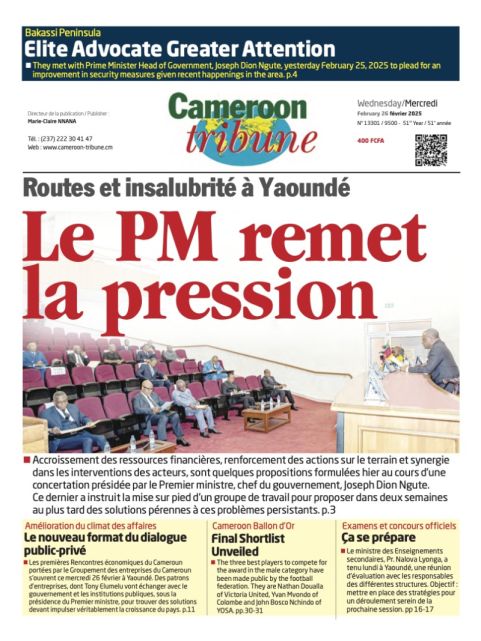Priority To Local Solutions!
- Par Godlove BAINKONG
- 21 mars 2022 11:49
- 0 Likes
Cameroon, like other countries within and even without the African continent, is currently going through challenging moments with regards to the population’s cost of living. Owing to global crisis like the drop in export earnings, the advent of Covid-19 with its battery of hostile consequences and today the raging crisis in Eastern Europe notably the Russia-Ukraine war; prices of most produce are witnessing exponential hikes in the market. The cries of households on the disturbing skyrocketing prices are louder these days and the effects felt differently by different countries based on the strength of their economies to weather storms.
Cameroon which has over the years depended largely on the export of mostly raw materials, on one hand, and huge import of finished products to sustain the economy, on the other hand is having a good feel of the global shocks. Buyers complain that the prices of almost every product is either going up or having the propensity to do so any time soon.
The global crises have made imports difficult and when importers strive to bring home any product (finished or raw material), it is at higher rates. The higher cost of import or production means someone has to shoulder the responsibility. Regrettably, the final consumer whose purchasing power is already very low, is often forced to pick the bill. The decision taken by government, on instructions of the Head of State, to reduce by 80% the sea freight transportation cost to be included in calculating customs duties following threats from importers with regards to the damaging effects of Covid-19, importers say, is salutary but not enough to calm the waters. The fact that prices keep rising in the market despite the measure taken last year and extended this year by two months is telling of a deeper problem.
As government, producers and distributors continue devising means of striking a bargain in the very dicey hikes in prices of some basic commodities, scarcity of some raw materials with the goal of protecting local industries and enterprises and cushioning general difficult living conditions without penalizing one party, serious thought should be given to local solutions first and foremost. It is a fact that what the country is going through couldn’t be avoided looking at the global context where inter-dependence is inevitable, but had Cameroon maximized its potentials in all domains, the pain would have been milder.
The world, being a global village, no doubt, entails one sharpening the other for all to stand the test of time. But any country that depends largely on the outside world on certain issues like feeding the population or getting basic amenities to keep the local economy going runs a risk of crumbling in the slightest of global meltdowns. This is where Cameroon is wanting!
It is inconceivable that a country hugely blessed by nature with all manner of potentials would catch a cold each time importers sneeze. For instance, Cameroon is one of the rare countries where almost everything can be cultivated anywhere. It has been said time and again that it suffices to throw any grain anywhere in the country to have a heavy harvest. The country has vast arable lands, two interchangeable seasons throughout the year which permits farmers in some parts of the country to plant and harvest twice a year and a youthful population which could be an asset. These are production-enhancing factors in the hands of decision-makers.
How comes the country possesses all these potentials but still depends largely on the outside world sometimes to feed its population remains astonishing. Available statistics are startling on what government spends yearly to import rice, maize, fish, flour, oil and other high-consumer products. These are scarce financial resources which would have been directed to other productive sectors of the economy had local production of the hugely-consumed products been optimal.
Government may consider revising its strategies. While looking for short-term solutions to contain the prevailing situation where struggling citizens are obliged to cough out additional sums of scarce liquidity to obtain meagre quantities of what they need most to live, coming up with a workable strategy on how to produce more in quality and quantity is imperative. Agronomic researchers have often been vocal, for example, on how Cameroon has the possibility of stepping up rice production with upland rice which they opine can be grown anywhere. Such research results can be tried and implemented on larger scale.
Keen observers of the country’s landscape from north to south and east to west would attest that Cameroon still has much land that is lying fallow. It may be high time to revise the land policy so as to make the vital development tool easily accessible to those in need. Instead of embracing the cultivation of everything everywhere, stakeholders...
Cet article complet est réservé aux abonnés
Déjà abonné ? Identifiez-vous >
Accédez en illimité à Cameroon Tribune Digital à partir de 26250 FCFA
Je M'abonne1 minute suffit pour vous abonner à Cameroon Tribune Digital !
- Votre numéro spécial cameroon-tribune en version numérique
- Des encarts
- Des appels d'offres exclusives
- D'avant-première (accès 24h avant la publication)
- Des éditions consultables sur tous supports (smartphone, tablettes, PC)











Commentaires